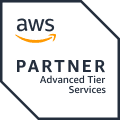AWS Knowledge
Google VPC vs. Amazon VPC: Which One Is Better?

Piyush Kalra
Jan 14, 2025
When looking to grow a company with Virtual Private Cloud, there are plenty of features to consider to ensure the network is efficient and secure. Out of all the competitors, Google Cloud Platform VPC and Amazon VPC stand out the most. However, how do you determine which is better suited for your business specific needs?
The blog makes a comparison of Google Cloud VPC and Amazon VPC and gives insights on what the reader is looking for, for instance, features, use cases, pricing, and everything else in between. Since 75% of companies use a cloud-based network, this choice has become detrimental to the functioning and structure of the company. By the end, you’ll have investigated all of the unique benefits of each platform and whether or not it is what you require.
What Is a Virtual Private Cloud (VPC)?

A Virtual Private Cloud is like having your own private section of a public cloud. It provides companies with an isolated and secure environment to conduct their cloud activities as if they are operating their own data center, but without the physical infrastructure's excessive expenditure and complexity. A VPC allows you to control your resources and security while taking advantage of the cloud's scalability and flexibility.
Why Does Your Business Need a VPC?
Stronger Data Protection: No matter if it is customer data, financial information, or trade secrets, a VPC guarantees the safety of sensitive data. You can implement tailored firewalls, network access control, and encryption specific to your business needs.
Adaptable to Business Growth: Is your company growing? With a VPC, scaling forward or backward is simple; whether resource needs arise from a product launch or season cycles, you are guaranteed to have what you need.
Lower Costs, Higher Efficiency: Instead of paying for expensive and unequally distributed hardware, a VPC allows you to only pay for what you use. It's a more efficient and thoughtful approach to resource allocation.
Customizable Network Setup: A VPC allows you to exercise control over the way your cloud is configured without the hassle of maintaining hardware. If you want your cloud set up the same way your office was, a VPC is the answer.
Overview of Google VPC

(Image Source: Google VPC)
Key Features
Global Network: Google VPC functions globally with a single scoped network that is easier to manage on an international level and manages region-wide resources with utmost ease.
Subnets and Routing: Provides custom subnet divisions and manages resource allocation with self-initiated route propagation.
Built-in Firewall Rules: Provides default firewall rules within the system tailored for appropriate protection against intruders.
Private and Hybrid Connectivity: Offers Cloud VPN and interconnect options that link your local facility resources with the cloud ones.
Load Balancing: Brings along global load balancing, which simplifies workflow distribution among different regions.
Use Cases
Big Data Processing: Get data sets done from any area without worrying about the packet loss thanks to low latency network connection.
SaaS Applications: Efficiently build worldwide operational and multi-scalable SaaS Services platforms.
Multi-Region Cloud Deployments: It fulfills the needs of global organizations that operate in several regions and require seamless networking readiness.
Overview of Amazon VPC

(Image Source: Amazon VPC)
Key Features
Full Network Isolation: Amazon VPC provides completely isolated virtual networks, which guarantees high levels of control and enhanced security.
Custom Subnet Design: Create public and private subnets as per different workload requirements.
NAT Gateways: Provide internet access for private subnets.
Peering Connections: Link several VPCs together, even if the Amazon Web Services accounts are different.
Integrated Monitoring Tools: Use Amazon CloudWatch to gain deeper insights into your network performance.
Use Cases
Hosting Web Applications: Effortlessly manage web servers and backend components.
Hybrid Cloud Strategies: Combine on-premises resources with the cloud using VPN and Direct Connect.
Data Driven Services: Manage and process large volumes of data with the lowest latency.
Why Compare Google VPC and Amazon VPC?
Comparing these two platforms helps a company strategically plan their conflicts involving the cloud infrastructure. Cost, security, networking, and ease of use are crucially important factors that can alter the operations and profits of the business.
Now, let's take a closer look at the comparison.
1. Networking Capabilities
Google VPC:
Global network availability with a centralized management interface.
Custom selection of route propagation across multiple regions.
Seamless communication between subnets for globally distributed workloads.
Amazon VPC:
Local area network structure; each VPC is linked to one particular region.
Elastic IPs that are utilized allow better handling of IPs.
Multiple interconnections and routing capabilities for Inter-VPC communication.
2. Security Features
Google VPC:
Built-in firewall rules for specific regions enhance control.
Private IP addresses allow effortless communication secure within the network framework.
Provides encryption and compliance for sensitive workloads.
Amazon VPC:
Security Groups allow flexible control over inbound and outbound traffic.
Network ACLs manage traffic at the subnet level for more protection.
VPC Internal data transfer is private and secure by encryption.
3. Performance Metrics
Google VPC:
High-speed network with minimal latency, ideal for big data workloads.
Global infrastructure provides connectivity to the network that is dependable.
Amazon VPC:
Consistently available through multiple availability zones.
Advanced monitoring with AWS CloudWatch.
4. Cost Analysis
Google VPC:
Free tier includes 50 GB of storage and 1 GB of Cloud NAT data each month.
Pricing items include subnets, VPNs, and networking egress fees.
Sustained use discounts available for long-term users.
Amazon VPC:
No costs for creating VPCs, but charges apply for NAT gateways, VPNs, and data transfers.
Free tier covers 750 hours of Elastic IP usage with EC2.
Potential hidden costs with inter-region data transfer.
5. User Experience and Management Tools
Google VPC:
Access management through the Google Cloud Console.
Great Actionable reports with Advanced Network monitoring.
Amazon VPC:
Supports multiple interfaces, including AWS CLI and SDKs.
Highly detailed monitoring integrations with CloudWatch Logs.
Case Studies
Google VPC: Cominvi CoMinVi Company
Challenge: CoMinVi needed to enhance its IT infrastructure in regard to server capacity, decrease downtime and expenses.
Solution: Migrated to Google Cloud alongside partner Nubosoft. They configured Virtual Private Cloud, Compute Engine, and Cloud Storage for higher performance, reduced latency, and better operational efficiency.
Results:
55% decrease in infrastructure spending
Significant reduction in downtime and outages.
60-70 milliseconds latency improvement.
Network automation threat detection improved security.
Increased application speed and overall system performance.
Amazon VPC: TextNow Company
Challenge: TextNow raises network security and performance standards while trying to lower data transfer costs.
Solution: Used AWS PrivateLink to VPC for data transfer over a private network supported by Datadog for monitoring and optimizing.
Results:
93% cost reduction for data transfer expenses.
Elimination of public internet enhanced data security.
Easier configuration modification with a five-minute code change.
Greater employee and debugging productivity.
Pros and Cons of Each Platform
Google VPC
Pros:
Networking is simple and has few global restrictions.
Excellent for multi-region deployments.
Integrated low-latency options for data-intensive tasks.
Cons:
Understanding pricing can be difficult.
Limited hybrid cloud capabilities compared to AWS.
Amazon VPC
Pros:
Exceptional control over network architecture.
Ideal for hybrid cloud setups and regional workloads.
Extensive suite of proprietary management tools.
Cons:
Exclusively designed for certain areas, which can add complications to global plans.
Additional costs for specific features like NAT gateway.
How to Choose the Right VPC
Choosing between Google VPC or Amazon VPC, your choice will highly depend on your business's needs and your Cloud's infrastructure objectives. Each Option has its own set of benefits which are focused on different priorities and use cases. Below is a summary explaining when you would select one over the other.
Why Choose Google VPC?
Google VPC is unique because of its global networking features. If your business services across multiple regions or countries and you are looking for a single network that covers the entire globe, then this is the best option for you.
Its global construct eliminates additional configuration for inter-region communications, which greatly improves the experience for companies concentrating on cloud-native environments or heavily scalable low latency global access applications. Moreover, with Google’s advanced reputation in Machine learning and data analytics, VPC is a great supplement as well, which is especially beneficial for businesses that focus on AI powered solutions.
Why Choose Amazon VPC?
Amazon VPC, on the other hand, excels when regional control and flexibility are top priorities. It provides businesses with control over specific regions, which is beneficial for companies with stringent compliance or latency needs in certain regions.
If you plan to use a hybrid cloud approach, with on-premises infrastructure supplemented by cloud resources, you will be glad to know that Amazon VPC has the tools you need. Additionally, if you already use tools within AWS or require a wide range of cloud services, it only makes sense that Amazon VPC is your choice, given that AWS has a service of such magnitude.
Now, which one should I go with, huhh?
Choose Google VPC for global reach, scalability, and AI-focused operations.
Choose Amazon VPC for regional control, hybrid cloud strategies, and access to AWS services.
Your choice should align with your business priorities and long-term goals
Conclusion
Choosing the right VPC is a complex task that can greatly determine the effectiveness of your business. Considering the structure’s ability to scale, its security features, its cost-effectiveness, and other essential business requirements are key in this respect. The proper VPC selection is not just supportive of business operations; it propels the enterprise’s innovation, efficiency, and sustainable growth.
So, why wait? Start exploring VPC services and take your infrastructure to the next level.
Join Pump for Free
If you are an early-stage startup that wants to save on cloud costs, use this opportunity. If you are a start-up business owner who wants to cut down the cost of using the cloud, then this is your chance. Pump helps you save up to 60% in cloud costs, and the best thing about it is that it is absolutely free!
Pump provides personalized solutions that allow you to effectively manage and optimize your AWS and GCP spending. Take complete control over your cloud expenses and ensure that you get the most from what you have invested. Who would pay more when we can save better?
Are you ready to take control of your cloud expenses?


